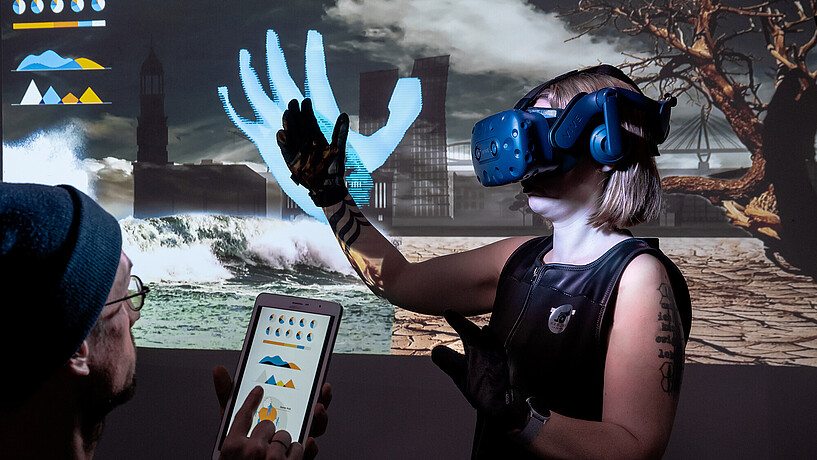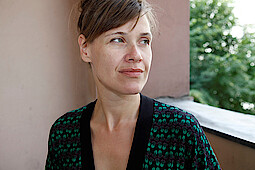One of the first SIGs to take up work was the Data Science and Artificial Intelligence group made up of Dr. Susanne Draheim and Prof. Dr. Kai von Luck together with Dr. Huib Aldewereld, Prof. Dr. Johan Versendaal and Marije Braun from Utrecht. In monthly lunch meetings, the participants introduce themselves and selected projects, partly to recruit additional members to the open working group. The goal is to meet in person, and planning is already underway for an initial mini-conference in Utrecht this spring. Especially for newly appointed researchers, the SIGS also provide a good opportunity to quickly and easily become involved in joint research and preparing EU proposals in international teams. The groups are also well-suited to cross-university collaboration on topics in the area of studies and teaching. We spoke with one of the group's leaders, sociologist Dr. Susanne Draheim, about the work currently underway.
Frau Dr. Draheim, what are the advantages of this new way of organising work within special interest groups?
Academic cooperation typically takes place across universities, which means that researchers network nationally and internationally in their respective discipline's community, at conferences and in professional associations. The SIGs have initated a forum for exchange that makes researchers' activities, such as publications, presentations, workshops, projects and proposal submissions, visible within the research groups. The SIGs are open to additional researchers and therefore provide a good opportunity for international networking, especially for junior researchers and newly appointed academics.
What is the goal of the Data Science and Artificial Intelligence working group? Who is participating and why?
Our SIG is intended for interested researchers working in the area of data science and, more generally, the interdisciplinary field of articial intelligence. We aim to attract university instructors, academic staff members and doctoral students, but even Master's students who are interested are welcome. We are still in the initial phase and are currently reviewing the field of applicants and testing suitable formats for exchange and cooperation. The interests of those involved are diverse; in most cases they want to undertake subject-related or institutional networking in order to expand their own expertise and find international research partners. Some people also want to become involved in a new subject area or in cooperative research.
How are researchers working together in the CARPE consortium?

Exploring a virtual world.
You head the working group together with colleagues from Utrecht. How are you working together in the pandemic? How is exchange taking place?
We're interested in getting to know one another in person and, above all, in exploring the participating universities and cities. This is of course not possible at the moment, which means that our cooperation is limited to regular email exchanges and Zoom meetings. At the beginning of October 2021 we had a well-attended SIG kick-off meeting as part of the CARPE conference. Roughly 20 colleagues introduced themselves and their work. Since December 2021 we've been holding monthly online-lunch lectures on our subject areas. This is why we're looking hopefully towards spring, when an initial in-person workshop is planned in Utrecht.
Can you tell us briefly about the range of topics? We're talking about a wide array of subjects, from machine learning to data mining and robotics. How do you link them thematically?
It is true that a wide range of topics fall within in our SIG – from technical questions in the area of machine-learning infrastructure and smart-maintenance approaches, to statistical methodological approaches such as data analytics or predictive medical systems, to reflexive interdisciplinary perspectives on artificial intelligence such as AI ethics or explainable AI. We organise and bundle these topics into future-oriented working groups so that subject-specific exchange is possible for the participants.
What drives you personally to invest your time in the SIG? What is your motivation and what are your goals?
I find the international exchange with the CARPE universities very fruitful, including the in-person visits – when these are possible again. Also, at the Smart Systems Research and Transfer Centre we are always looking for international cooperation partners for joint research projects. As a social scientist, I am especially interested in the methodologically reflexive topics explainable AI and AI ethics.
(Interview: Katharina Jeorgakopulos)
Additional information
Creative Space for Technical Innovations
On the terms 'explainable AI' and 'AI ethics':
Explainable AI (XAI) is artificial intelligence intended to make it possible to understand how dynamic systems with non-linear programming such as artifical neural networks, deep-learning systems and genetic algorithms generate their solutions.
AI ethics is a research area for the development of ethical standards for the study and application of artificial intelligence.
(Source: Wikipedia)
Contact
Faculty of Engineering and Computer Science
Smart Systems Research and Transfer Centre
Creative Space for Technical Innovations (CSTI) Lab
Hamburg Livingplace Lab
Dr. Susanne Draheim, Managing Director
T: +49 40 42875 8408/ -8482
susanne.draheim (at) haw-hamburg (dot) de

